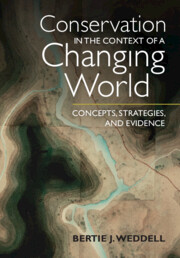Book contents
- Conservation in the Context of a Changing World
- Conservation in the Context of a Changing World
- Copyright page
- Dedication
- Contents
- Preface
- Acknowledgments
- Introduction
- Part I Maintaining Populations of Featured Species: A Utilitarian Approach to Conservation
- Part II Protecting and Restoring Populations and Habitats: A Preservationist Approach to Conservation
- Part III Promoting Biocultural Diversity and Resilience: A Stewardship Approach to Conservation
- 9 Historical Context
- 10 Central Concepts
- 11 Strategies
- 12 Strategies
- Postscript
- Appendix: Types of Ecosystems
- Bibliography
- Index
9 - Historical Context
New Opportunities and Challenges
from Part III - Promoting Biocultural Diversity and Resilience: A Stewardship Approach to Conservation
Published online by Cambridge University Press: 28 September 2023
- Conservation in the Context of a Changing World
- Conservation in the Context of a Changing World
- Copyright page
- Dedication
- Contents
- Preface
- Acknowledgments
- Introduction
- Part I Maintaining Populations of Featured Species: A Utilitarian Approach to Conservation
- Part II Protecting and Restoring Populations and Habitats: A Preservationist Approach to Conservation
- Part III Promoting Biocultural Diversity and Resilience: A Stewardship Approach to Conservation
- 9 Historical Context
- 10 Central Concepts
- 11 Strategies
- 12 Strategies
- Postscript
- Appendix: Types of Ecosystems
- Bibliography
- Index
Summary
By the late twentieth century, changing social, economic, and political conditions along with new scientific insights and trends in ethics and philosophy presented challenges not fully addressed by utilitarian and preservationist conservation. Indigenous rights activists, advocates for animal rights and the rights of nature, ecofeminists, scholars in the social sciences and humanities, legal experts, and representatives of nongovernmental organizations, national governments, and international development agencies offered diverse perspectives and agendas. Many disputed the idea that people are not part of nature, while others suggested that Indigenous peoples should be considered guardians of nature. Some promoted sustainable development along with attention to the social, political, and cultural consequences of conservation, particularly for the survival of threatened cultures and marginalized groups that have often been displaced by reserves. These developments led to the emergence of a stewardship approach to conservation that sustains complex ecosystems characterized by ecological and cultural diversity.
Keywords
- Type
- Chapter
- Information
- Conservation in the Context of a Changing WorldConcepts, Strategies, and Evidence, pp. 223 - 245Publisher: Cambridge University PressPrint publication year: 2023

